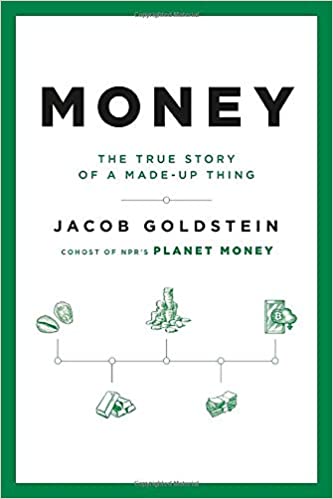
In troubled economic times like now, knowing how money works can help you through the trials ahead for all of us. The coronavirus is changing the world economy in drastic ways. This will accelerate inequality. Those of us with assets–houses, cars, stocks, bonds, 401ks, etc.–will get richer as the Federal Reserve pumps up the Stock Market. Those without assets will slide into poverty.
Jacob Goldstein’s clever Money blends a history of money with the invention of banking and finance. “The essence of finance is time travel… Saving is about moving resources from the present into the future; financing is about moving resources from the future back into the present.” (p. 46)
Goldstein writes clearly with excellent examples. Money explains what fiscal calamities loom ahead and what you can do to survive them. GRADE: A
TABLE OF CONTENTS:
AUTHOR’S NOTE — xi
I. Inventing Money — 1
1: The Origin of Money — 3
2: When We Invented Paper Money, Had an Economic Revolution, Then Tried to Forget the Whole Thing Ever Happened — 13
II. The Murder, the Boy King, and the Invention of Capitalism — 25
3: How Goldsmiths Accidentally Re-Invented Banks (and Brought Panic to Britain) — 27
4: How to Get Rich with Probability — 35
5: Finance as Time Travel: Inventing the Stock Market — 45
6: John Law Gets to Print Money — 55
7: The Invention of Millionaires — 63
III. More Money –75
8: Everybody Can Have More Money — 77
9: But Really: Can Everybody Have More Money? — 89
IV. Modern Money — 99
10: The Gold Standard: A Love Story — 101
11: Just Don’t Call It a Central Bank — 117
12: Money Is Dead. Long Live Money — 135
V. Twenty-First-Century Money — 149
13: How Two Guys in a Room Invented a New Kind of Money — 151
14: A Brief History of the Euro (and Why the Dollar Works Better) — 169
15: The Radical Dream of Digital Cash — 187
16: CONCLUSION: The Future of Money — 213
Acknowledgements — 227
Notes — 229
Index — 243
I don’t think I will read this, but it is very interesting to me. I’ve been reading the daily installments of Samuel Pepys’s diary (Pepys’ Diary and Pepys was very concerned with safeguarding his money, especially after the Great Fire of London in 1666. He had his coins taken in wagons to the country and buried for a time to protect it. It really makes you think about the differences between then and now, and especially the FDIC.
Jeff, Samuel Pepys had the same concern about money that we do: is it reliable, safe, secure? The pandemic makes all of these issues relevant…and troubling.
When we become a nation/world that looks after “the least of these” instead of those with the most, we will be a better people.
Patti, Greed ran rampant over the past four years. Something has to change!
Yes, there was no greed before then! Certainly not by the Clintons!
Bob, some people think that Greed is Good. Not me.
Does the book mention the new cryptocurrencies like bitcoin?
What I always found interesting is inflation, deflation and the change in relative value.
I still remember when the $ was worth 4.20 Deutsche Mark (Gold standard times) – now it’s down to around 1.60 (.80 €) and when we visited the USA several times around 10 years ago we were extremely lucky:
The $ was below .70€ – everything was so cheap, we went shopping like crazy for ourselves and family members too!
A more horrible example is the British pound:
When I went to Canterbury and London for the first time 55 years ago the pound was around 11 DM i e 5.50€ – now it’s down to 1.10€.
And then of course there was inflation in the Communist countries before 1989 – I still remember when they changed the value of the Dinar – just removing four zeroes!
Wolf, yes. MONEY deals with cryptocurrencies like Bitcoin. But, I’m not a believer.